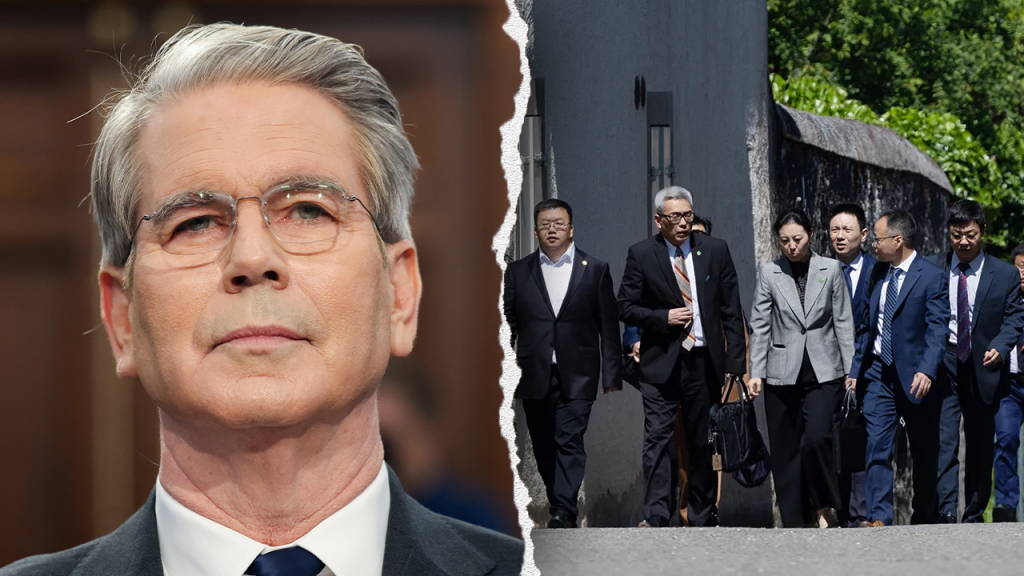In a significant development in U.S.-China relations, President Donald Trump announced on Saturday night that “great progress” was made during extensive trade negotiations held in Geneva, Switzerland. The talks included U.S. officials like Treasury Secretary Scott Bessent alongside a Chinese delegation, where multiple aspects were discussed. While no major breakthroughs were confirmed after more than ten hours of discussions, negotiations are set to continue into Sunday, hinting at ongoing efforts to resolve escalating trade tensions.
| Article Subheadings |
|---|
| 1) Overview of the Trade Negotiations |
| 2) Background and Context |
| 3) Key Players Involved |
| 4) Implications of the Trade Talks |
| 5) Future Prospects for U.S.-China Trade Relations |
Overview of the Trade Negotiations
The trade negotiations in Geneva signify a critical juncture in U.S.-China economic relations amidst rising tensions characterized by tariffs and counter-tariffs. President Trump, utilizing social media platform Truth Social, highlighted the talks as significant progress was made, indicating a hopeful shift for the future of trade between the two economic giants. The discussions were expected to tackle various issues, though specifics were sparse following the marathon ten-hour meeting.
Treasury Secretary Scott Bessent, a crucial figure in the talks, was part of the U.S. delegation which met with their Chinese counterparts. The extended dialogue showcases an effort by both nations to find common ground in the ongoing trade dispute that has raised concerns in global markets.
Background and Context
The backdrop of these negotiations includes a series of tariff impositions that have intensified trade tensions over the past several months. On April 2, the Trump administration announced a round of tariffs that included a significant 145% tariff on selected Chinese goods. Following this, China retaliated by raising tariffs on U.S. imports, complicating the economic landscape.
The current trade deficit, which reached a staggering $1.2 trillion in 2024, has been a focal point of the negotiations. President Trump has aggressively advocated for tariffs as a means to curb this deficit and bring back manufacturing jobs to the United States. The administration’s stance has appeared resolute, even amidst international criticism regarding the economic impacts of the trade war.
Key Players Involved
Key figures in these negotiations include President Donald Trump, who has been vocal about the need for fair trade practices, and Treasury Secretary Scott Bessent, who has played an instrumental role in articulating the U.S. position. The Chinese delegation, though not fully identified, is believed to consist of high-ranking officials familiar with trade dynamics and economic policy.
The involvement of U.S. trade representatives signifies the high stakes of these discussions, with both countries recognizing the potential economic fallout from continued tariffs. Reports indicate that the economic landscape of millions of jobs is at stake, particularly in China’s export-driven economy, providing the basis for serious negotiation.
Implications of the Trade Talks
The outcome of these negotiations could have sweeping implications not just for U.S.-China relations but for global trade dynamics. Analysts view a potential resolution as crucial to stabilizing economic relations and restoring confidence in markets. Trump’s prediction of “great progress” suggests optimism that a mutual agreement might ease tensions, a critical element considering the interconnectedness of global economies.
Failure to reach satisfactory terms could exacerbate the ongoing trade war, leading to more significant repercussions such as price increases for consumers and setbacks for businesses reliant on international supply chains. Given that the U.S. imports far more from China than it exports, the negotiating leverage has been a subject of intense discussion among economists.
Future Prospects for U.S.-China Trade Relations
The future of U.S.-China trade relations remains uncertain as negotiations are set to continue in the near future. There is speculation around the adjustments of tariffs and trade barriers, with the potential for a new trade framework that could replace the more adversarial stances of recent years.
Moving forward, analysts suggest that both nations will need to adopt a more collaborative approach that seeks long-term solutions to economic issues rather than temporary fixes. The current groundwork laid in the Geneva talks may serve as a foundation for future negotiations encompassing a broader range of economic policies and practices.
| No. | Key Points |
|---|---|
| 1 | The U.S. and China are engaged in substantial trade negotiations to resolve ongoing tariff issues. |
| 2 | President Trump expressed optimism about the progress made during the talks in Geneva. |
| 3 | The negotiations are pivotal for addressing the U.S. trade deficit with China. |
| 4 | Failure to reach an agreement could result in further economic instability and price increases. |
| 5 | The outcome of these talks will significantly impact the future of global trade relations. |
Summary
The recent trade talks between the U.S. and China in Geneva represent a critical moment in international economic relations, showcasing a potential shift towards more constructive dialogue. While no concrete agreements have emerged yet, the discussions illuminate the complexities of trade policy and its implications for both nations and beyond. The expressed optimism from leaders hints at the possibility of easing tensions, but the path forward remains fraught with challenges and uncertainty.
Frequently Asked Questions
Question: What are the main goals of the U.S.-China trade negotiations?
The primary goals include addressing tariff issues, reducing the trade deficit, and establishing more equitable trade practices between the two nations.
Question: How does the trade deficit impact negotiations?
A significant trade deficit can lead to increased pressure for changes in trade policy, such as implementing tariffs, to protect domestic industries and jobs.
Question: What are the potential consequences if negotiations fail?
Failure to reach an agreement could lead to heightened tariffs, increased consumer prices, and strained economic relations, negatively impacting global markets.


